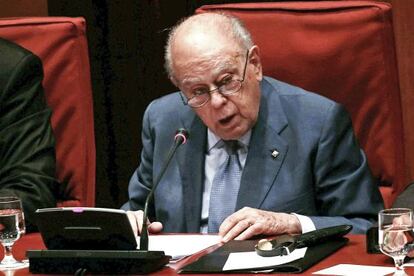“I was not a corrupt politician,” ex-premier Pujol tells Catalan parliament
The 84-year-old former nationalist leader explains hidden fortune revelations to regional deputies

Former Catalonia regional premier Jordi Pujol on Friday denied any allegations of corruption as he appeared before the Catalan parliament to explain revelations that his family hid a multi-million-euro fortune abroad for 34 years.
The money he had kept away from the eyes of the Spanish tax man came from his late father’s inheritance, the former Catalan nationalist leader told the parliament’s Institutional Affairs Committee. “I can say that I was not a corrupt politician,” he stated, adding that his only plan had been “to construct Catalonia, to make a country,” not to get rich. “I have never received anything, I repeat, never, beyond my salary as premier.
Having money abroad can be criticized, but that doesn’t mean its origin is illegal” Jordi Pujol
“Having money abroad can be criticized, highly criticized, but it does not mean that its origin is illegal,” he continued. His father, Florenci Pujol, who died in 1980, deposited 140 million pesetas in international accounts in foreign currency, the value of which increased over the years as a result of several devaluations of the peseta, he explained. He had earned from businessmen who wanted to import cotton from America and Egypt, and left it to Pujol’s wife and children because he was wary about his son’s decision to go into politics.
The 84-year-old began his speech at 4pm by predicting that he would receive a lot of harsh criticism for his actions during his appearance, but that they would probably “not be as great as the recriminations I have made against myself.” The man who governed in Catalonia for 23 years added that though he was bound to give explanations to the courts and tax authorities, he had come to the Catalan parliament out of “respect.”
Pujol’s appearance came following a petition filed by all seven Catalan parliamentary groups. The original request was made by all of them apart from the CiU nationalist bloc, of which Pujol’s own CDC party makes up one half, back in July, just after he issued his written confession that he had only recently regularized his fortune with the Spanish tax authorities. The CiU added its support on September 2.
Pujol’s appearance represents one of the darkest hours for the CDC, which, after initially finding itself examining ways of relaunching the party after the confession, is now hoping to limit the episode to a private matter.
CDC leader and regional premier Artur Mas’s announcement on Thursday that he is planning to sign the decree to call a referendum on independence for the region for November 9 has been viewed not only as a means of pushing back the central government’s contesting of the vote by a few extra hours – Prime Minister Mariano Rajoy is set to preside an extraordinary Cabinet meeting to tackle the subject on Monday – but also as an attempt to minimize the effects of Pujol’s appearance. If the signing of the decree will not completely mask the fallout, it will go some distance towards deflecting attention away.
Tu suscripción se está usando en otro dispositivo
¿Quieres añadir otro usuario a tu suscripción?
Si continúas leyendo en este dispositivo, no se podrá leer en el otro.
FlechaTu suscripción se está usando en otro dispositivo y solo puedes acceder a EL PAÍS desde un dispositivo a la vez.
Si quieres compartir tu cuenta, cambia tu suscripción a la modalidad Premium, así podrás añadir otro usuario. Cada uno accederá con su propia cuenta de email, lo que os permitirá personalizar vuestra experiencia en EL PAÍS.
En el caso de no saber quién está usando tu cuenta, te recomendamos cambiar tu contraseña aquí.
Si decides continuar compartiendo tu cuenta, este mensaje se mostrará en tu dispositivo y en el de la otra persona que está usando tu cuenta de forma indefinida, afectando a tu experiencia de lectura. Puedes consultar aquí los términos y condiciones de la suscripción digital.








































